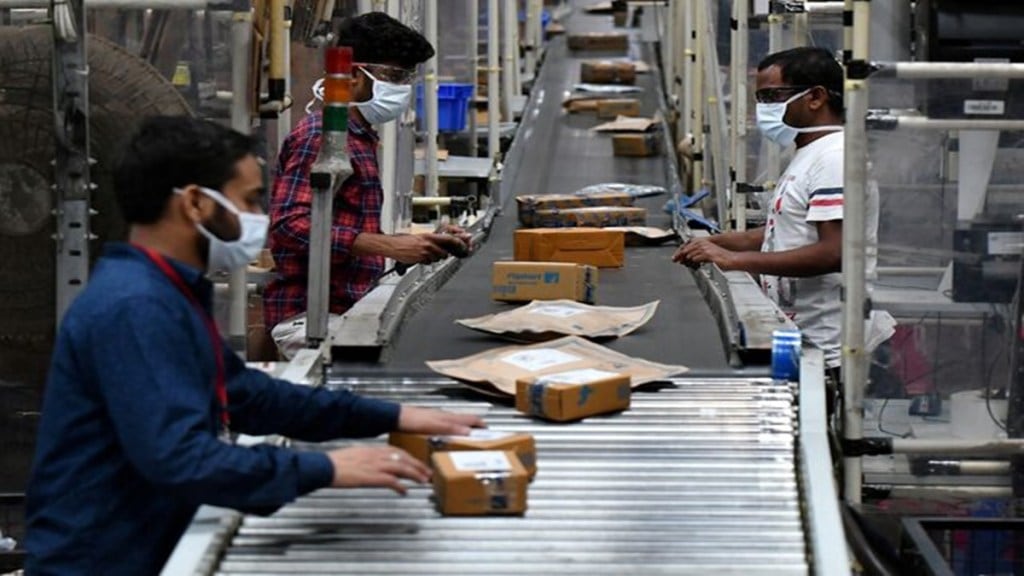By Vishal Jain
Gone are the days, when logistics was about moving goods from point A to point B. It is now about aspirations, hopes, economy and convenience! Logistics in this digitisation era is a complex web of processes that, when optimised, can significantly enhance efficiency and profitability. The global logistics market is projected to reach $12.68 trillion by 2027, growing at a CAGR of 7.5% from 2020. As companies strive to keep pace with increasing consumer demands and competition, innovative technologies have emerged as game-changers in holistic supply chain management.
With exciting new breakthroughs happening daily in areas like big data, cloud computing, algorithm development, connectivity, and processing power technology is paving the way for a holistic supply chain. The rise of IoT, artificial intelligence (AI) and machine learning (ML) has significantly boosted efficiency, accessibility, and cost-effectiveness in the supply chain. For instance, AI-driven systems for courier allocation are fine-tuning shipment allocation, so they’re not just on time but also cost-effective.
According to a recent report by MarketsandMarkets, the global market for real-time location systems (RTLS) is expected to reach $16.2 billion by 2028, driven largely by demand in logistics and transportation.
Here’s how innovative technologies are contributing to supply chain management:
Internet of Things (IoT)
The Internet of Things (IoT) is revolutionizing how we connect physical objects to the digital realm, transforming how we track, manage, and streamline operations. With IoT devices, businesses can gain insights into temperature, humidity, and location, ensuring that sensitive goods are stored and transported under optimal conditions. The IoT cloud platform market is expected to grow from $6.4 billion in 2020 to $11.5 billion by 2025. The IoT solution segment has dominated the overall IoT monetisation market. This level of visibility not only enhances operational efficiency but also improves customer satisfaction by providing clients with real-time updates on their shipments.
Also read: How will the future of the supply chain look in 2025?
Boosting transparency and efficiency in logistics, IoT has marked a major leap forward for supply chain management. Sensors and GPS trackers collect data on various parameters, enhancing end-to-end visibility. IoT-enabled GPS trackers monitor the location of goods, ensuring timely deliveries and reducing the risk of theft or loss. Besides this, IoT sensors monitor the temperature and humidity levels in storage and transportation units, ensuring optimal conditions for perishable goods. This reduces spoilage and waste, which is a significant issue in India, where nearly 40% of food production is wasted annually. Additionally, IoT fuel sensors track fuel consumption and optimize routes, reducing fuel costs and environmental impact. Efficient route planning and fuel management can lead to a 10-15% reduction in logistics costs, as per industry reports.
Artificial Intelligence (AI)
AI technologies are also making waves in logistics. AI is addressing common supply chain bottlenecks and revolutionising first, mid and last-mile delivery while optimising inventory management and transparency.
For instance, AI-powered Driver Monitoring systems are ushering in a new era of driver and vehicle safety. AI Dash Cam is offering a comprehensive solution for capturing critical footage on the road and offers driver behaviour analysis such as speed, acceleration, and braking patterns, ensuring safer driving practices and optimised fleet management. Besides this, AI’s prowess in route optimization is also a major win fr supply chain management. By harnessing historical data, analyzing traffic patterns, and considering weather conditions, AI enables logistics companies to chart the most efficient routes. This not only reduces fuel consumption but also ensures timely deliveries, translating into substantial savings.
Automation and Robotics
Automation is no longer a futuristic concept; it’s happening now and revolutionizing the logistics sector. The adoption of automated guided vehicles (AGVs) and robotics in warehouses can enhance picking and packing accuracy by up to 99% . Automation is also minimizing human error and boosting operational efficiency, allowing staff to focus on more strategic tasks.
Technological advancements have become the backbone of supply chain management. For instance, for the pharmaceutical industry, maintaining the integrity of the supply chain is critical. IoT devices ensure that medicines are stored and transported at the right temperatures, while AI predicts demand based on disease outbreaks and seasonal trends. This not only reduces waste but also ensures that critical medicines are available when needed.
Embracing innovative technologies like AI, IoT, and automation is essential for a holistic supply chain, boosting efficiency and transparency. The future of logistics is smart, connected, and undeniably transformative.
(The author is co-founder and CEO, Roadcast. Views expressed are the author’s own and not necessarily those of financialexpress.com)


















